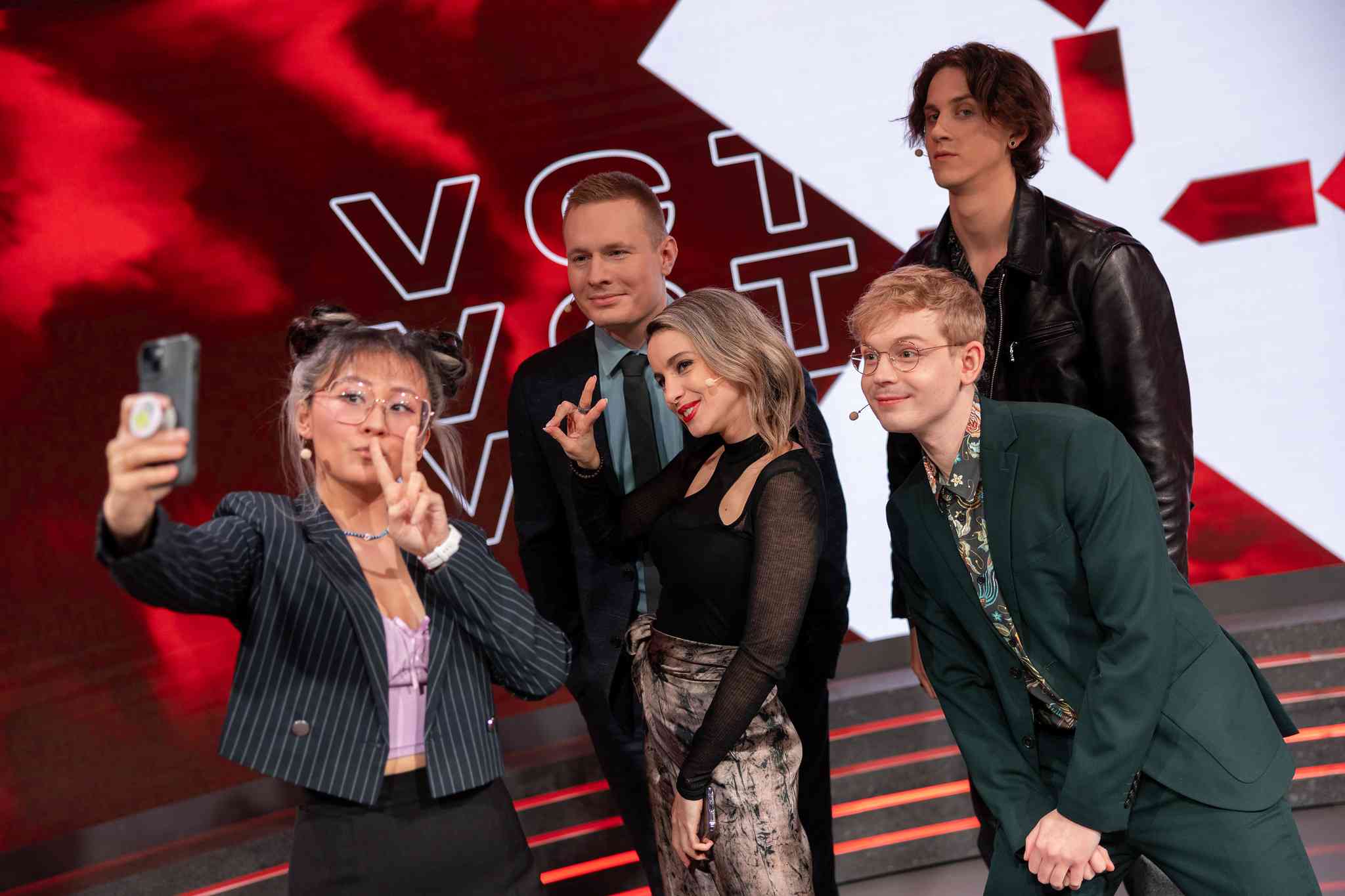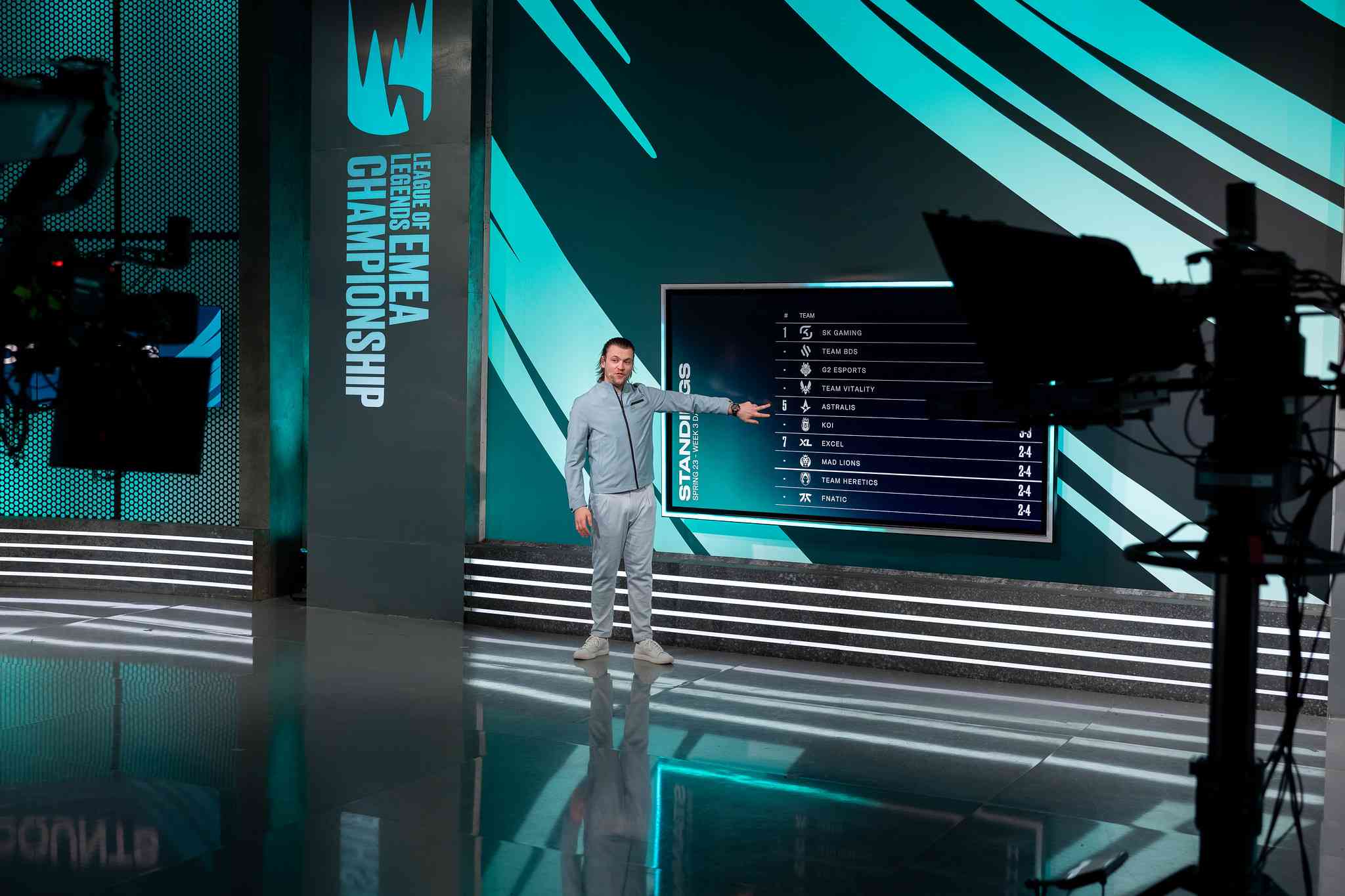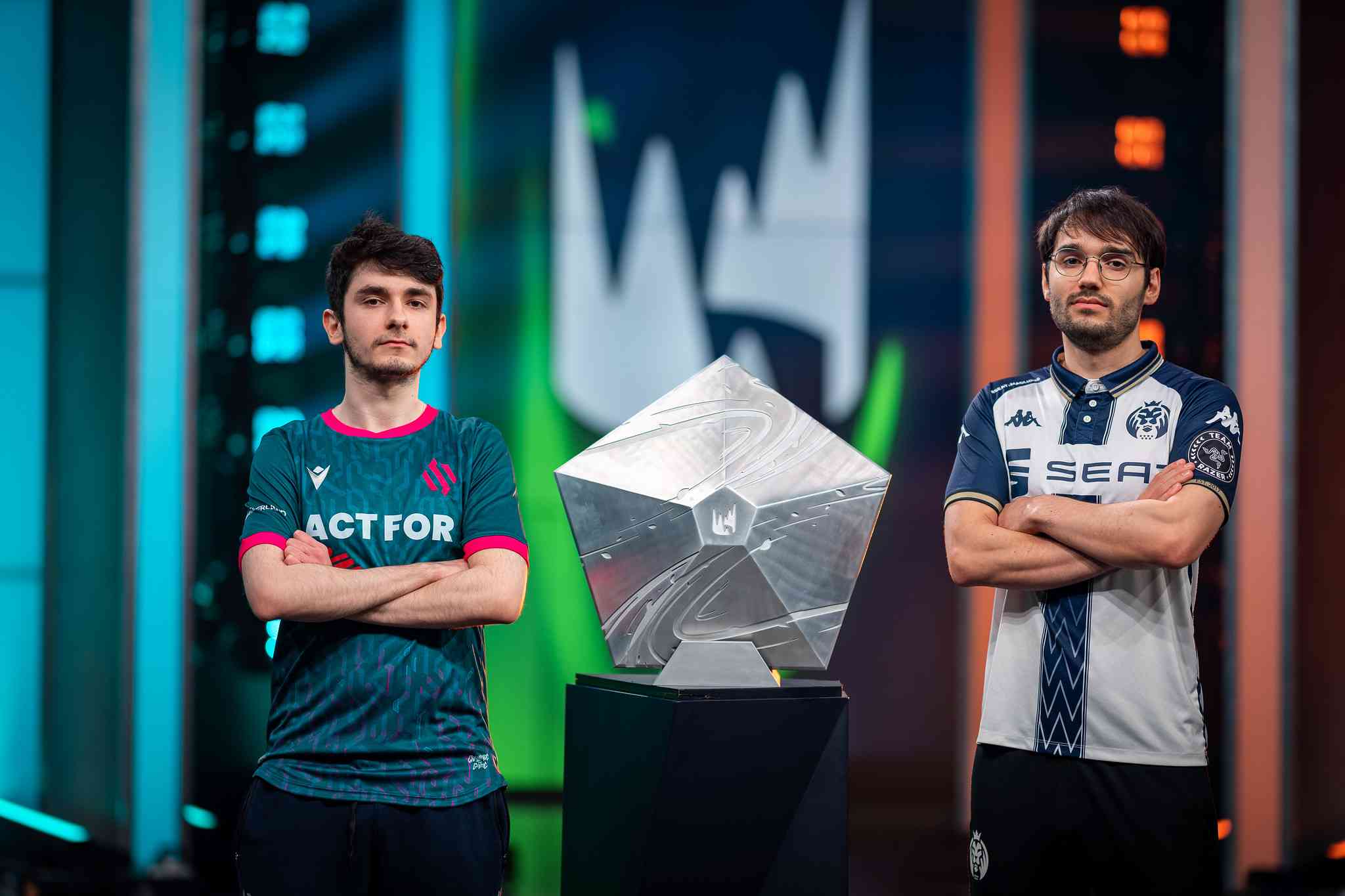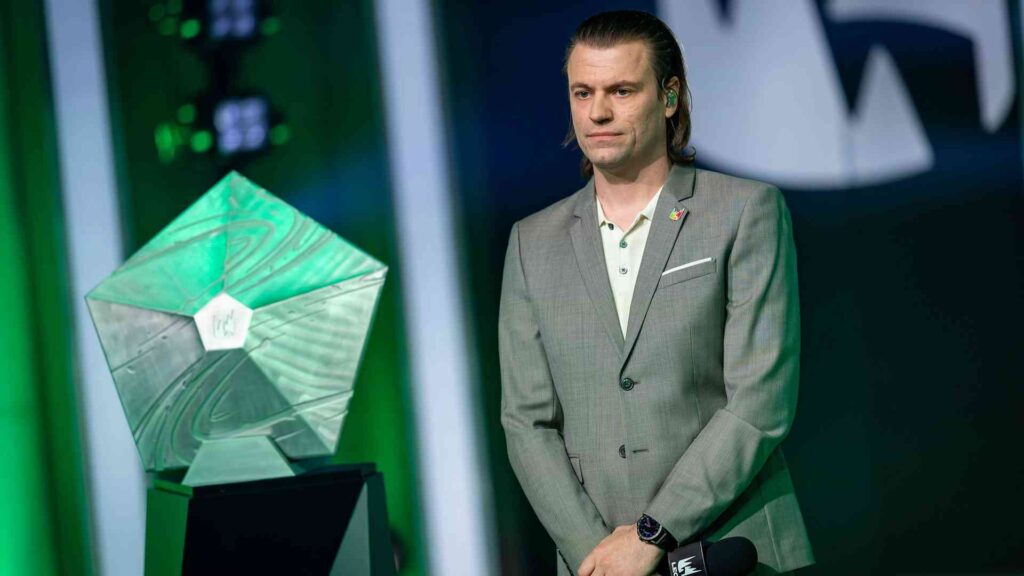Known as EULCS long ago, the League of Legends European Championship (LEC) has been on a journey with many twists and turns for better or worse. After changes and changes and changes, the Spring Split of LEC 2023, the second showing of the league’s new format, is close to its completion, with BDS on one side and MAD Lions on the other. We are still determining where the road leads and what will happen next, the only thing we know is how fun the journey is and hopefully will be.
Just before the LEC Finals ceremony started, we had a long and interesting chat with someone who has been part of this journey since the takeoff, the titan of the LEC desk, Trevor’ Quickshot’ Henry. In his own words, he’s “the old guy” – he has been a part of the professional League of Legends in Europe SINCE 2013.
The first article of this interview had to be a two-parter. First, we talked about the positives and the negatives of the format changes of LEC, the pipeline of new talent that keeps the show fresh, and the past, present, and future of mindblowing tech used to improve the viewing experience.
Aykut Sapaz, BLIX.GG: Hello and welcome, Quickshot. Thank you so much for being here with me right now. Thank you so much for the time. I want to start off with how you are doing. How’s it going right now?
Quickshot: Very good, very exciting. The new format for the 2023 season has been challenging to adapt to. The extra show days in the week, the more compressed schedule’¦ But I think it’s provided a lot of entertainment, a lot of excitement, and a lot of energy back into the League. And when you think that the sport is only 10-11 years old, a little bit longer in terms of the actual game, we’re still trying to find that formula that really works for League of Legends esports. So, it’s been a very exciting year, both professionally and personally.
BLIX: You’ve really cut right through what I was going to lead up to. I wanted to talk about LEC format changes in length, but before that, I assume people are currently coming to the studio [for the finals]. What’s the atmosphere going to be like?
Quickshot: I mean, it’s very good. You know, as somebody that’s been fortunate to travel to a lot of cities and experience a lot of different fandoms and cultures, the German fans have always been a little bit more reserved, a little bit quieter at times. But this year, especially after a few years of no studio, and no fans, with the Coronavirus shutting everything down, the energy is more palpable. And I also think the stakes of every game have just made everyone a lot louder and more excitable, so that is something that’s really fun for me as a shoutcaster to feed off their energy.
New format, same game
BLIX: It’s really fun to see shout casters and fans getting along in the studio, playing games during pauses and all that. And the games are more exciting due to the changes in LEC formats. How is that going for you? Since you’ve been a part of LEC for so long, how’s the change been for you?
Quickshot: I mean, um, it’s kind of par for the course. If I zoom out and look at the big picture, the European league has always been a little bit more experimental, a little bit more willing to change things up. We tried group systems, we tried best of twos, best of threes, and gone back to best of ones, so at its core, it’s just another change that we’re trying. I think every time we do something different, it’s always exciting at the start. This particular change has been more complex when it comes to planning work weeks and aligning schedules with other departments in the office, and there’s a lot of stuff behind the cameras that have been frustrating at times, just because of the new challenges that the format brings, with three show days and staggered work weeks. And some people do Monday to Friday, and that’s ending the show week on a Monday. But ultimately, the games, the stakes, and the fact that almost every two or three weeks, we’re eliminating people from a split just makes it feel more like smaller tournaments rather than a longer-running league. And I think in the history of esports, no matter the game, the decade, those smaller tournaments with high stakes tend to be easier to understand and a little bit more exciting to watch.
BLIX: Yeah, it’s more… I don’t know how to say this, you feel the stakes rather than a lot of pressure. Yeah, you feel the pressure. You feel almost as if you’re the one playing, even watching them. And that’s just such a Survivor vibe, giving you excitement. I love that for the LEC, and we’ve seen a lot of good things-bad things come with this. What do you think is the biggest pro of this change?
Quickshot: I mean, the biggest pro of the change is the viewer experience and the reduction in low-stakes games. You know, I think in the 2022 format, for example, if you had teams that were underperforming and struggling, their losses and their matches ultimately would not be as consequential.
Because the quantity of games goes up, and as long as the teams are winning the majority of them, 80% win rate, if you drop a game to a ninth or tenth-place team in the older format, it didn’t really matter. And that also meant that it didn’t quite have that same intensity or focus for viewers. But now, on the other hand, there are only nine regular season games. If you drop one game, it’s incredibly important. So, you know, as the old guy and the guy that kills all the narratives and overdoes it, every game counts. Every game really does count, and I think that’s going to be the biggest win of what we’re trying. We’re playing with it.
BLIX: I was gonna say every game counts, but you said it before I could.
Quickshot: Yeah, exactly! It is my job, the consistent recurring narratives.
BLIX: Of course, of course. And yeah, it is very exciting to see every game having importance. It’s like watching a season of entertainment with a big plot twist that was said at the start. It’s very exciting. Since you’re behind the scenes of all of this, what is the biggest con of this change? What would you change if you could?
Quickshot: I mean, the biggest challenge that we’ve had to face in adapting to the new workflow is the reduced pre-production time. You know, we lose one of the days in the week that we could plan or prepare any skits or cold opens, and if you’re a very astute viewer, you’ll notice that the cold open that we ran at the beginning of almost every week in 2022 aren’t there in 23. So, there is an opportunity cost with running this new format. I mentioned the logistical challenges earlier with collaborating with other teams and departments. I mean, my work week, for example, starts on a Saturday, I work until Wednesday, and then I have Thursday and Friday off. That’s my weekend. That does not align with everyone else.
So, those are the biggest challenges. I would say, though, that ultimately as it’s predominantly the games in the tournament that is always the highest priority, at the moment, those sacrifices are acceptable. And once we’ve got some more downtime between splits and looking ahead, we’ll be able to look and see what we want to do, what we want to bring back, or what challenges we want to address.
New talent and mind-blowing technology
 The (mostly) new talent of LEC (Image Credits: Michal Konkol/Riot Games)
The (mostly) new talent of LEC (Image Credits: Michal Konkol/Riot Games)BLIX: Yeah, there will be a lot of time to address these challenges and improve on the positive side. Because, as you said yourself, LEC has always been an experimental League, at least compared to the other leagues in the League of Legends esports environment. I also wanted to ask about that because LEC has received changes other than its format. For example, we’ve seen a lot of new pros on the stage and new talents, and also, we’ve seen a lot more different tech used in LEC broadcasts. I want to get into these individually. How is working with the new pros and talents, especially the on-air talent?
Quickshot: I think Europe has always had a very strong pipeline, you know, we’ve got ERLs and EMEA Masters to draw from, and that allows development and training that is a bit of a luxury for us. I’m very fortunate as well that the entire team has been together for a long time, so we’ve got a great set of mentors and guides to help build up some of those core skills of the on-air talent team. I think everybody knows the show that we’re producing, and some of the willingness to weaponize cringe, so that’s also something we look for, that creativity and that willingness to get involved, so that’s very exciting.
I will talk about the teams and the players. I mean, every year, you’re going to get new pros; every year, pros are going to be different. You have some that are incredibly camera-aware from early on, but I think more exciting for me is how organizations and teams are changing and bringing success. I think the fact that G2, KOI, and Fnatic are not even in finals, we can really not make it there. The fact that we’re seeing in recent years new teams rising up, I find that exciting.
When I think about the sport, and I’m an NFL viewer, if you go back to the early days of the NFL and how that league developed and grew, over the 30 or 40 years of foundation building, orgs came and went and merged and sold and rebranded and changed names, and it took 50 odd years for the NFL to build the foundations that it then grew to what it is today. And you know, we’ve been talking about how we want League of Legends to be a multi-generational sport for as long as I’ve been with the company, and it just feels like those are steps that are making that vision a reality.
BLIX: I am very glad to see the vision is more accepting towards the future and development, which solidifies the game to continue and prolong its life as it continues. It’s fun to see that implemented in real-time with new teams rising up. We are seeing BDS in finals today; a year ago, people would have said, “Astralis vs. BDS, I don’t want to watch that.
Quickshot: I said that, yeah. I said that on air. I did.
BLIX: Yeah, people like yourself, and now we’re seeing them succeed. We’ve seen Astralis, BDS, and all these new teams get to where they are, and it’s very, very fun to see. And I also want to ask about the tech itself because we, as the viewers, only see a few of the new things behind the scenes, but you do. Many things have been tried and failed, too, for example, I assume. What is your most successful introduction to tech this year?
Quickshot: I don’t think I’ll say this year specifically, but I’ll talk a bit more holistically in a bigger picture. The control room and the tech that we’ve been employing in League of Legends esports worldwide and specifically in Europe, for a long time has been literally cutting it. You know, we’ve had a content series in the past where we’ve talked about how when EULCS first started in Berlin in 2016, the production room, the control room was in Santa Monica. We used an undersea cable called dark fiber, and we just used the power of the internet to mix and cut and add graphics from Santa Monica to Berlin.
That technology has developed and grown and has been kind of the building block, the skeleton of Project Stryker, which, as you know, are production facilities that we’re still in the process of building. One is set up in Dublin; I had the pleasure of opening that particular venue. And Striker, for example, is helping out Legends, Riot, TFT with things like recording footage for replays, databasing, control room tech, and streaming uploading of content. We have hours and hours and terabytes of data, so all of that is incredibly exciting. And anecdotally, we’ve actually had traditional broadcast folks doing studio tours here in our venue to look at the tech that we have because a lot of the legacy media didn’t or haven’t had the need to invest in some of those things. So, that’s really cool and really exciting, and it gives you kind of that feeling of that sense of someone working here, that we’re looking at future things, we’re looking at using these amazing tools that make the show run, to continue doing it from different locations and in smart ways that are both content and financial and global and timing and all that.
 I can’t believe the side wall was fake the whole time (Image Credits: Michal Konkol/Riot Games)
I can’t believe the side wall was fake the whole time (Image Credits: Michal Konkol/Riot Games)To be more specific and actually answer your question, I think augmented reality is one of the coolest things that we’ll see for anyone that’s been fortunate to see our actual analyst desk where Sjokz will stand when she’s on the left in front of our big 16 screens wall the stage ends to her left but sometimes you’ll see it blown out with a big video or a graphic, that’s not real. It’s augmented. It’s not real, people. It’s not real. People are sitting at the desk; if you’re looking at the wide shot at the desk, the person that’s on the far right-hand side of the desk, the wall ends there. So, when the screen goes wide, and you see that desk extend all the way around, it’s an augmented reality wall, and that’s just freaking cool. So that’ll be my most specific example of tech that just blows my mind.
BLIX: I am now even more amazed, and I also want to say it’s so fun to hear people describe something that they’re invested in, and it’s always fun to see Rioters talk about the improvements they have. It’s very cool, and you’re excited to share it too. So that’s very fun to talk about. I could go on and on about it.
Quickshot: I’ll tell you as well. I will tell you as well very quickly. I do have about two or three minutes before I have to go and get ready for the show. We’re actually filming this just before the finals opening ceremony is starting. So I think we might have to do like one or two quick questions before I have to run.
BLIX: Okay then, I want to quickly ask about the power level of LEC on the international stage.
Quickshot: I have no idea. I can’t answer that because when I looked at MSI, any assumptions that I had were disproven on the rift. Everyone thought that T1 was going to smash in the LCK finals, and they kind of got embarrassed or choked. Could technically start calling T1 chokers if you look at the number of second-place finishes they’ve had. And coming into this weekend. I thought G2 was going to smash MAD Lions. I didn’t think Vitality was going to lose to MAD Lions, so I have no idea what to do.
What I will say is, because the teams are competing here in the EU, because it is a very brutal schedule, and I think because it’s a double elimination best of bracket, I think some of those things will play into your team’s benefit somewhat. Less travel, the only catch I’ll say is that, obviously, we’ll have less time to prepare for the patch. So, I think whoever wins today between MAD Lions and BDS will have a little bit of an advantage with a little couple extra days, avoiding Play-ins, and being able to watch and learn. But I’d say I’m hopeful. I think I have high expectations for G2. They always have pretty consistently stepped up, even in their struggles internationally. So, I would say that I’m still hoping and looking for a high-place finish.
BLIX: That is a good answer. I had many more questions, but I see you’re running out of time.
Quickshot: Yes, I literally just got a ping from my producers.
 The hyped finals of the LEC 2023 Spring Split, BDS vs. MAD (Image Credits: Michal Konkol/Riot Games)
The hyped finals of the LEC 2023 Spring Split, BDS vs. MAD (Image Credits: Michal Konkol/Riot Games)BLIX: Okay, let’s quickly have a prediction for today’s final then, and then I’ll let you go.
Quickshot: Okay, my heart tells me BDS, and my head tells me MAD Lions. I think MAD Lions will take a 3-1.
BLIX: Okay, thank you so much for being here.
Quickshot: Thank you so much. We’ll speak when there’s not a show, and we have more time.
BLIX: Hopefully. Thank you.
Quickshot: Ciao. Thank you so much.
This article is the first part of our interview with Quickshot. The second post will be attached here upon publishing.



